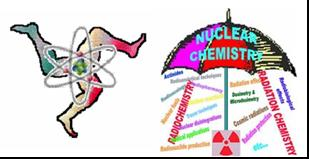Speaker
Amit Kumar
(Radiochemistry Division, Bhabha Atomic Research Centre)
Description
Study of reactions involving incomplete mass transfer has been an active area of investigation in heavy ion reactions at low and medium energies. Entrance channel parameters, namely, projectile energy and entrance channel mass asymmetry are important in governing the contribution from different types of reactions involving incomplete mass transfer such as quasi-elastic transfer, massive transfer or incomplete fusion and deep inelastic collisions. In addition, there may be contribution from fission like events. In the present work, cross sections of evaporation residues have been measured in 28Si+75As at Elab=183.7 MeV to investigate the contribution from these reactions. Experiments were carried out at Pelletron-LINAC facility at Tata Institute of Fundamental Research, Mumbai, India. Targets of 75As, prepared by vacuum evaporation on carbon backing, were bombarded by 28Si beam. Cross section of evaporation residues were measured by radio-chemical method based on recoil catcher technique followed by off-line gamma-ray spectrometry. Analysis of the gamma-ray spectra showed mainly the formation of evaporation residues with mass number A in the range AT to AT+AP, where AP and AT are mass numbers of projectile and target respectively, suggesting incomplete fusion to be the dominant non-compound process.Due to the contribution from incomplete fusion experimental cross-sections were higher than the calculated cross-section using PACE2 code, which is based upon statistical model. These studies did not show any significant contribution from deep inelastic collisions.In these studies significant contribution from fission was also observed. Different components were observed in recoil range distribution due to fission products and evaporation residues.
Author
Amit Kumar
(Radiochemistry Division, Bhabha Atomic Research Centre)
Co-authors
K. Ramachandran
(Nuclear Physics Division, Bhabha Atomic Research Centre)
P. K. Pujari
(Radiochemistry Division, Bhabha Atomic Research Centre)
R. Tripathi
(Radiochemistry Division, Bhabha Atomic Research Centre)
Sudarshan Kathi
(Radiochemistry Division, Bhabha Atomic Research Centre)
Suparna Sodaye
(Radiochemistry Division, Bhabha Atomic Research Centre)
